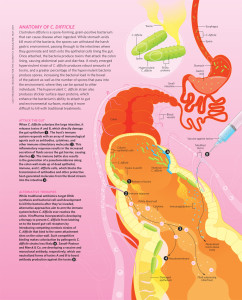 Swallowing pills containing a concentrate of fecal bacteria successfully stops recurrent bouts of debilitating Clostridium difficile (C. diff) infection by rebalancing the bacteria in the gut, suggests a study being presented at the Oct. 4, 2013 IDWeek meeting.
Swallowing pills containing a concentrate of fecal bacteria successfully stops recurrent bouts of debilitating Clostridium difficile (C. diff) infection by rebalancing the bacteria in the gut, suggests a study being presented at the Oct. 4, 2013 IDWeek meeting.
Infection from C. diff bacteria is such a concern that the Centers for Disease Control and Prevention (CDC) named it one of the three most urgent threats in its recent landmark report on antibiotic resistance. C. diffsickens half a million Americans and kills 14,000 every year. C. diff infection can occur after people take antibiotics, wiping out the good bacteria in the gastrointestinal (GI) system, allowing C. diff to flourish and leading to severe diarrhea. In some patients, infection continues to recur despite standard treatment with antibiotics. For patients trapped in that cycle, doctors have transplanted feces from healthy donors into their GI system to rebalance the bacteria and stop infections from recurring.
Fecal transplantation typically is delivered by enema, colonoscopy (placing a tube in the colon) or nose tube and is effective in nine out of 10 patients, according to published reports. The IDWeek research suggests the less-invasive pills are a viable and effective delivery method.
“Recurrent C. diff infection is such a miserable experience and patients are so distraught that many ask for fecal transplantation because they’ve heard of its success,” said Thomas Louie, MD, professor of medicine at the University of Calgary, Alberta, and lead author of the pill study. “Many people might find the idea of fecal transplantation off-putting, but those with recurrent infection are thankful to have a treatment that works.”
Indeed, additional research being presented at the meeting showed patients who received fecal transplantation through a tube in the nose were highly satisfied with the treatment, and said they would likely recommend it to a friend.
Fecal Transplantation by Pill
University of Calgary researchers reported a 100 percent success rate – none of the 27 patients who took the tablet-sized pills had a recurrence of C. diff, even though all of them previously had had at least four bouts of the infection. Patients ingested between 24 and 34 capsules containing fecal bacteria, often donated by family members.
To make the pills, researchers processed the feces until it contained only bacteria, and then encapsulated the bacterial concentrate inside three layers of gelatin capsule. This ensured the pills wouldn’t leak or disintegrate until they were past the stomach and into the small intestine – a potential advantage over other methods because it covers more of the GI tract, does not involve invasive and more costly procedures, and is more comfortable for patients, Dr. Louie said.
Dr. Louie said he first made pills for fecal transplantation when one patient failed to respond to the enema method on two occasions and also could not tolerate a nasal tube for medical reasons. The pills are made individually.
“The pills are a one-shot deal and seem to work. They are easier for patients and are well-tolerated,” said Dr. Louie. “It’s an exciting development in the field and could possibly even be used to maintain the balance of bacteria in the GI system in patients at risk for C. diff.””
Patient Satisfaction of Fecal Transplantation
In the study of fecal transplantation tolerance, researchers surveyed 28 patients three months after they had undergone the treatment through a tube fed through the nose and GI system to the small intestine. On a scale of one to 10, average patient scores were: 9.6 for overall satisfaction; 9.9 for ease; and 9.9 for likelihood of recommending the procedure to a family member or friend.
“Patients with C. diff often have 20 or more stools a day, which seriously affects quality of life and so they are very open to this treatment,” said Ravi Kamepalli, MD, an infectious diseases physician at the Regional Infectious Disease-Infusion Center, Lima, Ohio, and lead author of the study. “Human beings are 90 percent bacteria and once that balance is altered with antibiotics, opportunistic infections can cause serious problems. All we are doing with this treatment is resetting the balance.”
Dr. Kamepalli said he has treated 40 patients with recurrent C. diff using fecal transplantation, and all but one were cured, a 98 percent success rate.
C. diff is considered a healthcare-associated infection (HAI) because those at highest risk are older people who are taking antibiotics and receiving medical care, such as in a hospital or nursing home. HAI C. diff remains at high levels, according to the Centers for Disease Control and Prevention (CDC). Antibiotics targeted to C. diff may wipe out these bad bugs, but because levels of good bacteria in the GI system are low, C. diffinfection can recur once the antibiotics are stopped. C. diffinfection recurs after antibiotic treatment in about 20 percent of patients, and in those patients, it is 80 percent likely to recur.
Source: Infectious Diseases Society of America (2013, October 4). Fecal transplant pill knocks out recurrent C. diff infection. ScienceDaily. Retrieved October 5, 2013, from http://www.sciencedaily.com/releases/2013/10/131004105253.htm














